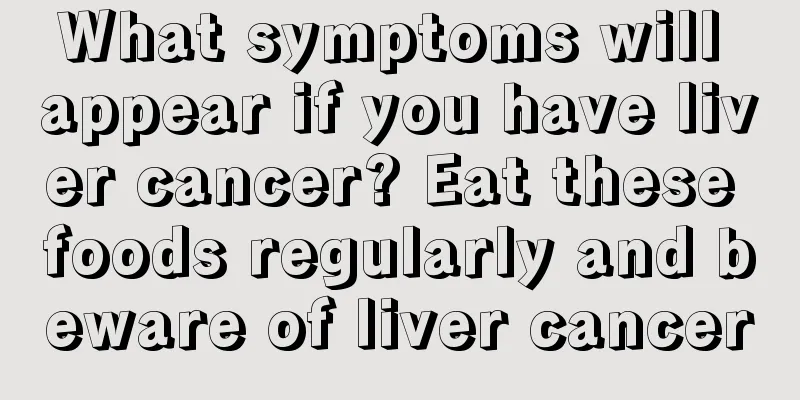What symptoms will appear if you have liver cancer? Eat these foods regularly and beware of liver cancer

|
The main cause of liver cancer is the malignant transformation of hepatitis, but aflatoxin in the diet is also one of the causes of liver cancer. Let’s take a look at which foods are likely to induce liver cancer. Beware of liver cancer if you eat these foods regularly Moldy food often contains fungi, and aflatoxin in fungi is a carcinogen that can induce liver cancer in humans, monkeys, mice, and poultry. The shortest time required to cause cancer is 24 weeks. Preventing fungal contamination of food is also a way to prevent liver cancer. You should pay attention to: 1. Peanuts, corn, sweet potatoes, rice, millet, etc. stored at home must be dried thoroughly and stored in a dry and ventilated environment. 2. Moldy peanuts, dried potatoes, dried radishes, etc. should be discarded and cannot be eaten by humans, livestock or poultry. 3. Peanut oil and cottonseed oil should not be stored for a long time. When a large amount of grain, oil or dairy products are suspected to be contaminated with fungi, the quarantine station should be asked to check and they can only be distributed, sold or consumed after approval. Stale oils contain a chemical component that can cause the structure of proteins to mutate, causing cells with mutated proteins to lose their normal functions and transform into early cancer cells. In addition, the replication of acids in some chemical components accelerates the aging process. Therefore, animal and vegetable oils should not be stored for too long, and oils that have deteriorated and have a rancid smell should not be eaten. Foods fried in rancid oils not only taste bad, but more importantly, they can cause liver cancer and shorten life expectancy. What are the symptoms of liver cancer? 1. Obvious loss of appetite: abdominal distension, indigestion, sometimes nausea and vomiting; 2. Dull pain in the right upper abdomen: There may be persistent or intermittent pain in the liver area, which may sometimes be aggravated by changes in body position. Liver cancer is harmful to health and well-being. 3. Fatigue, weight loss, unexplained fever and edema; 4. Jaundice, ascites, and skin itching; 5. It often manifests as nose bleeding, subcutaneous bleeding, etc. 6. Fever The fever caused by liver cancer is generally around 37.5℃~38℃, occasionally reaching above 39℃, with irregular fever pattern, usually without chills, and more common in the afternoon, sometimes with remittent high fever. Fever can be caused by tumor necrosis or its metabolites. 7. Other symptoms include hepatitis, cirrhosis, or large infiltrative tumor growth leading to liver decompensation. Patients may have a tendency to bleed, such as gum and nose bleeding and subcutaneous ecchymosis. They may also have hypoproteinemia, edema, ascites, abdominal distension, etc. Tumor metastasis to the lungs may cause coughing. When the tumor invades and blocks the hepatic vein or inferior vena cava, progressive lower limb edema may occur, and even ascites and other manifestations of Budd-Chiari syndrome may occur. |
Recommend
Early symptoms of pituitary tumor
Pituitary tumor is a tumor disease. Although most...
Vaccine to prevent tuberculosis
In ancient times, tuberculosis was called pulmona...
How to detect teratoma
Teratoma is an uncommon disease, and it often occ...
How many times of chemotherapy is usually given for cervical cancer
Cervical cancer can be treated with chemotherapy ...
What should I do if my butthole hurts and bleeds after pooping
If your anus hurts and bleeds when you poop, you ...
What are the ways in which health massage promotes the circulation of qi and blood?
Nowadays, more and more people pay attention to h...
What are the dangers of kidney cancer? What are the symptoms of kidney cancer?
Kidney cancer can cause physical and psychologica...
What are the things to pay attention to in immunotherapy for urticaria
Urticaria is a very common and terrible skin dise...
What is the reason for the pain in the big toe joint of my left foot
Joint pain is mainly caused by joint inflammation...
Can I take a shower right after the infusion?
Infusion is a very common treatment method in med...
What is interventional treatment for liver cancer? How can we control the metastasis of advanced liver cancer?
What is interventional treatment for liver cancer...
What are the magical effects of instant multi-grain powder?
Instant multi-grain powder is actually a food tha...
Do I need an anti-inflammatory injection before appendicitis surgery?
Appendicitis is something that everyone is famili...
This is what congenital glaucoma is all about
The medical term glaucoma appears very frequently...
Can surgery be performed in the late stage of esophageal cancer? You can choose
In the late stage of esophageal cancer, surgery c...









